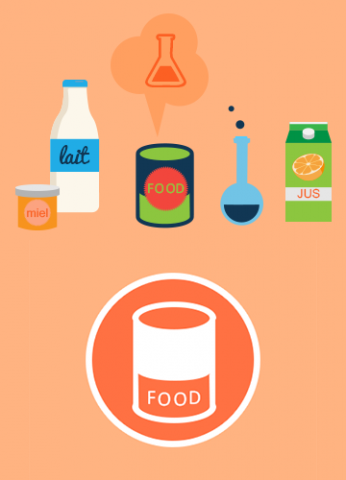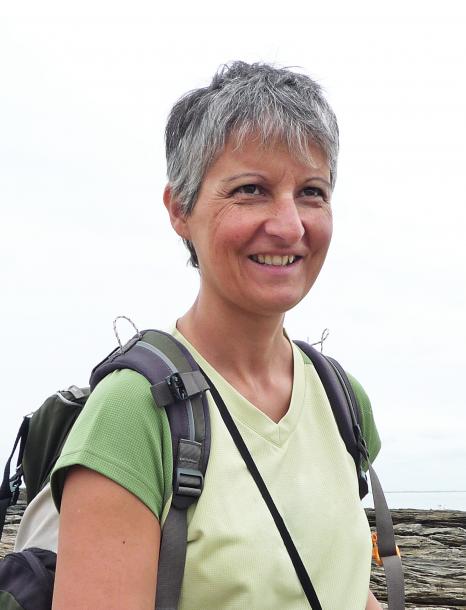
Valérie Camel: analytical methods for health security
Valérie Camel is a professor in analytical chemistry and health security at AgroParisTech and a researcher at the SayFood Laboratory (Food & Bioproduct Engineering / Université Paris-Saclay, INRAE, AgroParisTech). A specialist in targeted and non-targeted analysis methods of chemical contaminants and an expert with ANSES for over 15 years, she is also highly committed to educational innovation and to her students.
Valérie Camel’s choice of career path began in a rather traditional way with a physics/chemistry preparatory course at Lycée Pierre de Fermat in Toulouse. “As a daughter of schoolteacher parents, I saw myself joining the ‘École normale supérieure’ and becoming a teacher.” She was accepted at the ENS in Lyon and went on to start at the ESPCI in 1987. Convinced by the model then being put forward of learning through research, she decided to leave the school and continue her PhD at Université Pierre et Marie Curie. There she obtained her PhD in 1994 and her HDR (authorisation to direct the research of others - a post-doctoral degree) in 2002. She still wanted to teach and in 1996 passed the competitive exam to become a lecturer at INA P-G, followed by a similar exam in 2009 to become a professor at the same institution (which has since become AgroParisTech). She still teaches there to this day, alongside carrying out research with the team at Génie des produits (Product engineering, GéPro) in the SayFood laboratory.
Trace analysis of chemical contaminants
Valérie Camel studied the development of quick methods for extracting pollutants from soils with a focus on chemical warfare for her PhD thesis. “I was working in a Ministry of Defence study centre on chemical and biological weapons. The aim, within the framework of my thesis, was to successfully develop quick analysis methods to determine, for example, if a field was contaminated by chemical weapons before sending in troops,” explains the researcher. It was an opportunity for the young chemist to become a specialist in the development of analytical methods to detect traces. She went on to devote the rest of her research career to these developments, with different fields of application. In 1999, this was recognised when she was awarded the Analytical Chemistry prize by the “Société Française de Chimie” (French Chemistry Society).
From the environment to food matrices
The first area of application was the environment. “The focus of ten years of my career was on environmental issues. At first it was water treatment, before I turned my attention to soil rehabilitation. I worked in particular on advanced oxidation processes based on ozone (a gas which can be produced in a laboratory) and also based on chemical reagents, such as Fenton's reagent,” says Valérie Camel. It was at the turn of the year 2005 - when questions were starting to be asked about the chemical contamination of food - that Valérie Camel began to focus her research on food issues. She continues her research in this area at SayFood. “My aim is to develop and be able to approve analytical methods which can identify and monitor chemical contaminants - in particular neo-formed contaminants (such as acrylamide) from unwanted chemical reactions which occur during the manufacture of certain foods. We’re also increasingly working on the development of non-targeted methods,” explains the researcher.
Expertise in analytical chemistry for ANSES
Since 2006, Valérie Camel has also started carrying out appraisal work (always in line with her research areas) for various Specialist Expert Committees (SEC) at ANSES (French Agency for Food, Environmental and Occupational Health & Safety) on the risk assessment of biocide materials or contaminants in food in particular. She has joined no less than six Working Groups (WG) - all still within ANSES - between 2012 and the present day. “All this experience at ANSES has taught me a lot about toxicology, ecotoxicology and risk assessment. All these skills and an integrated approach have fed my teaching activities and, since the creation of AgroParisTech, this has led me to make suggestions on the content taught to our students. A few colleagues and I have championed the creation of a subject area devoted to Human Health to run alongside the school’s three traditional teaching areas (Environment, Forestry and Agri-Food). This new area attracts nearly a hundred students a year.”
A desire to contribute to communities
Valérie Camel’s expertise on health security issues, whether it is to do with research or teaching, is widely recognised. However, she has no desire to limit it to just these areas. She has always felt that it was important to “contribute to the community”, as she is fond of putting it. For example, in 2007 at AgroParisTech she set up a prevention and monitoring unit for students experiencing difficulties with the help of the Department of Studies and Student Life. Its aim was to support students and, if necessary, to refer them to specialists. “Alongside this unit, of which I’m very proud, we’ve also set up a pool of mentor lecturers who are happy to support a group of students each year and act as a contact point for them should they encounter any problems,” she adds.
As well as being happy to support her students, she is also quick to work together with colleagues from other disciplines for development projects. She is part of the cross-disciplinary team of lecturers at Université Paris-Saclay which set up CHIMACTIV, a site of digital educational resources in the field of the chemical analysis of complex media which has won several awards for the quality of its contents. “With the CHIMACTIV venture, I discovered a multi-disciplinary culture which I really loved in that it pushed us beyond our comfort zones and made us question ourselves until we created a shared vision and could move forward together.”
Innovative teaching and learning as a key focus
Moving forward together is also the mantra which has continually driven her to become involved in innovative teaching and learning. “I started to become interested in questions around educational practice from 2002 after completing a training course offered by the Ministry of Agriculture,” explains Valérie Camel. She continued her learning by attending workshops offered by the ParisTech network and from 2012, she became involved in the design of teaching and learning training sessions for higher education teachers. Since 2018, she has been involved in facilitating the teaching and learning seminar set up by Université Paris-Saclay to welcome its newly recruited lecturers. “In 2020, Université Paris-Saclay asked me to encourage and develop - among its lecturers who wish to do so - the SoTL approach (Scholarship of Teaching and Learning). Its objective is to transfer the researcher's methodology to his or her teaching activity, i.e. to adopt a well-researched, reflective approach to his or her practice and to value it,” she says. This is a mission which she is passionate about and to which she now devotes almost a quarter of her time.

